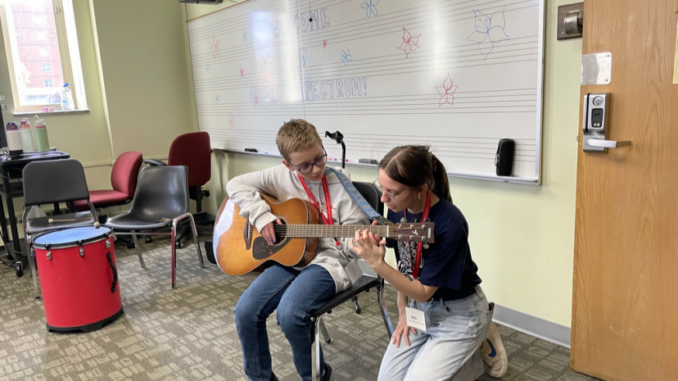
Hannah Peters | Staff Writer
Music is many things, but one of its most principal qualities is its power to be universal. Full Spectrum, a free musical event series aimed at exploring the role of music in the autism community, testifies to this truth.
Hosted by the City Music Center of Duquesne University, Full Spectrum’s mission is “to connect families and individuals in the autism community to one another through a common love and enjoyment of music,” according to Duquesne’s website.
Located in the Mary Pappert School of Music, the program series is held every Saturday on an open door basis from 10 a.m. to 1 p.m. throughout the month of April. During this time, guests have the opportunity to engage with sound and melody through several music-making activities.
This includes a drum circle, musical games and an ‘instrument petting zoo’ that allows visitors the chance to try an array of instruments alongside several music student volunteers. Additionally, they offer an open recording studio session with a live rock band and audio engineer.
Each week also features a rotation of presentations from experts in autism spectrum disorder (ASD) as well as performances from guest musicians, some of which are led by artists who are on the spectrum themselves.
The expert voice at this past session was Duquesne’s own chair of psychology, Dr. Elizabeth Fein, author of “Living on the Spectrum: Autism and Youth in Community.”
As for the musical performances held on the PNC Musical Hall stage, these are made possible by Full Spectrum’s partner, Band Together Pittsburgh, an organization that works to create opportunities in music for people with ASD.
One of these Band Together Pittsburgh performers from this past Saturday was Logan Smith, who sang ‘Giants in the Sky’ from ‘Into the Woods.’ Mother to Logan, Andrea Smith, says the highlight from the event was watching Logan learn a chord on the guitar for the first time.
“The music therapy here is awesome. He hasn’t really played instruments before because it’s one of those things where it’s just hard to be involved in,” said Smith.
Smith explains that many social activities, like team sports, are not often welcoming to children with autism. Events like these are important to her family for the community it builds and the opportunities it offers.
“Kids with autism don’t get to showcase their talent often because of behavioral issues or things that people just don’t know how to handle,” said Smith. “So it’s nice to have a place where they can perform in a loving environment where nobody’s judging. Everyone here has been so kind and welcoming.”
Thomas Carsecka, the director of music admissions and community programs at Duquesne, is also a parent of a child on the spectrum and is responsible for the Full Spectrum event.
“I had been thinking about what I can do in my role at Duquesne to piece these bits together and create something that is truly inclusive that explores a lot of different avenues of music within the autism community all at once,” said Carsecka. “So I came up with the full spectrum concept.”
This was the first time Carsecka had organized an event for kids on the spectrum; he explained that through this event, he’s found that his thinking about music as a tool for communication is changing.
“As far as the role [of music], it’s an evolving role. It’s one that can grow and change with our understanding of autism,” said Carsecka. “We have terms and vocabulary, but then a breakthrough happens and that vocabulary is no longer relevant. But music is something that is never wrong in that moment. It transcends and it changes with us over time.”
In addition to music, Carsecka spoke to another crucial element of the event, inclusivity.
“You don’t have to be on the spectrum yourself or even have a kid in your family to come and learn more. The nature of true inclusivity is come one, come all,” Carsecka said.“This is the focus and everybody’s welcome.”
Carsecka explained that building the event took a lot of collaboration, he guesses around 100 people are involved with running the event, including their other partnerships with Achieving True Self and Pittsburgh Youth Chorus.
He mentioned that students are also a major component of running the event. Students from all degree programs—music therapy, education, performance and technology—are helping run the event and leading the music-based activities.
Senior Ash Voight is one such student who volunteers every weekend as the acting team lead for music therapy activities. She says this event caters directly to what they learn here at Duquesne and that music plays an important role in building community for everyone, but especially for those with ASD.
“Music is for everyone first and foremost,” said Voight. “Music is the format for community so it’s a huge community builder. We’re finding ways to have other autists meet other autists as well as make music together and find that solidarity with others, no matter the difference in where they are on the spectrum.”

